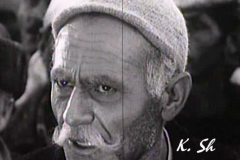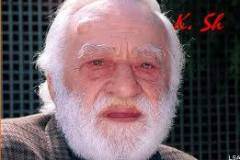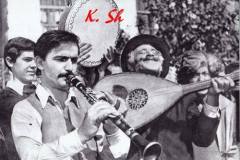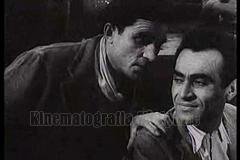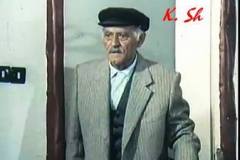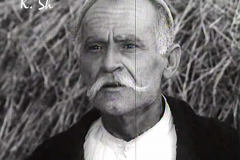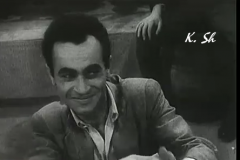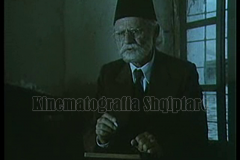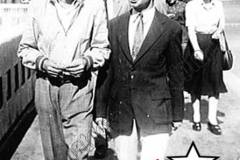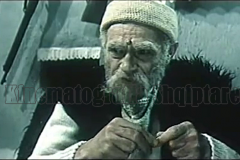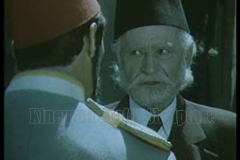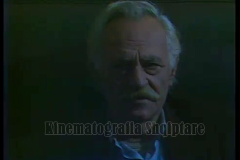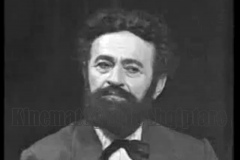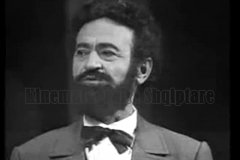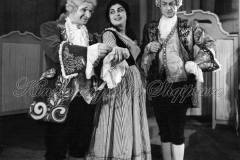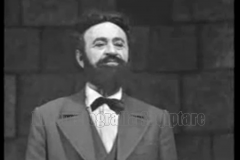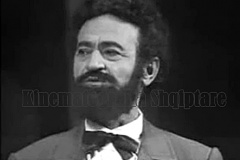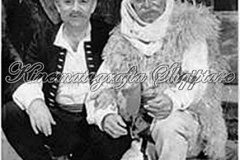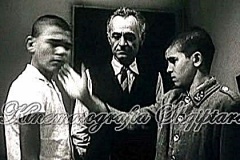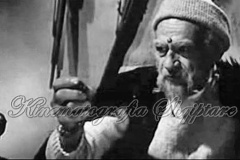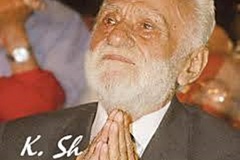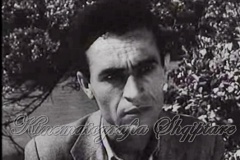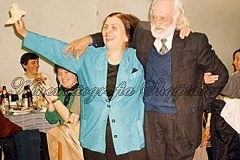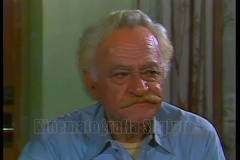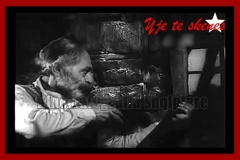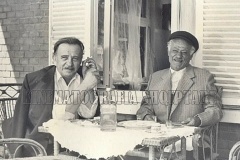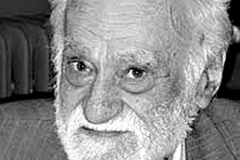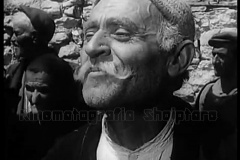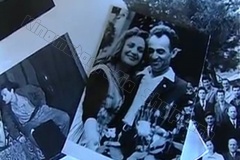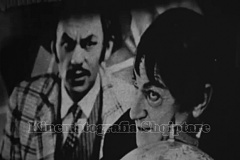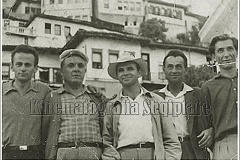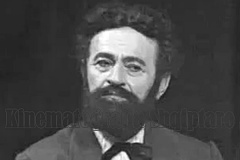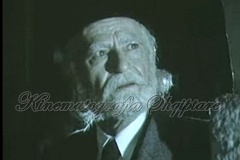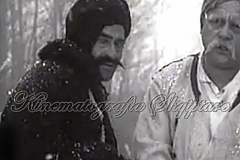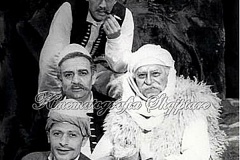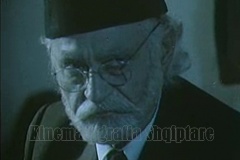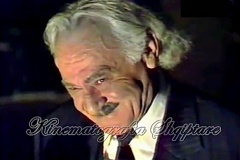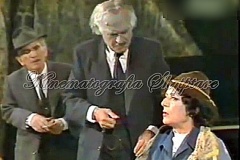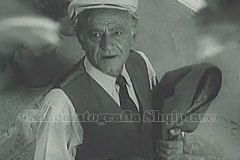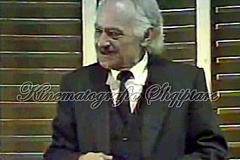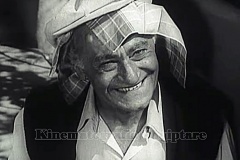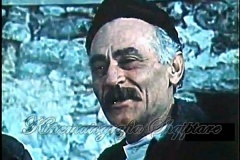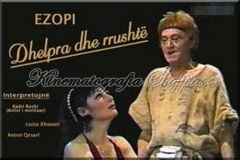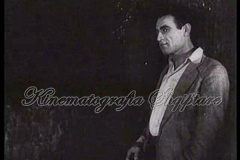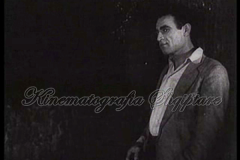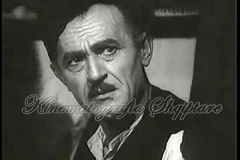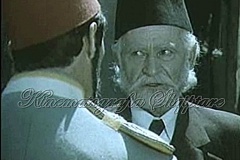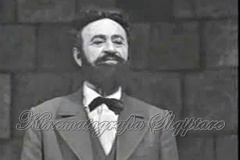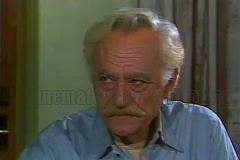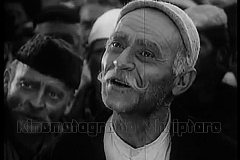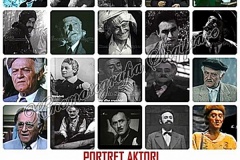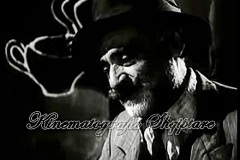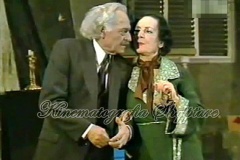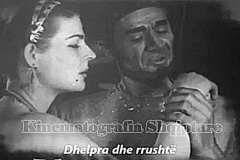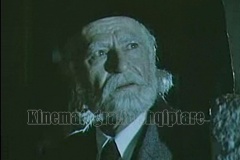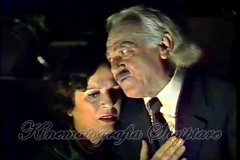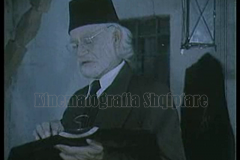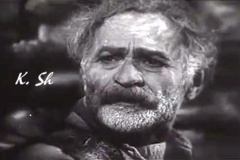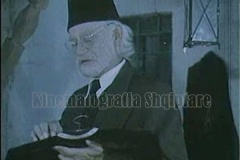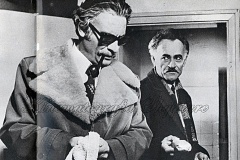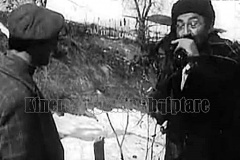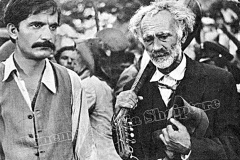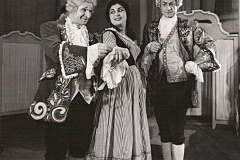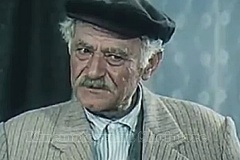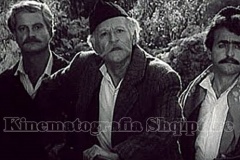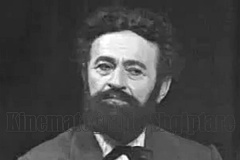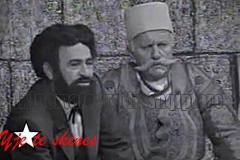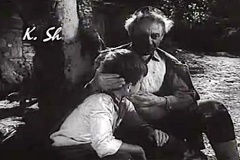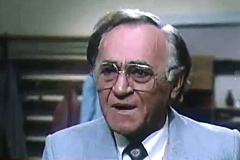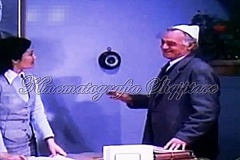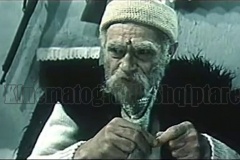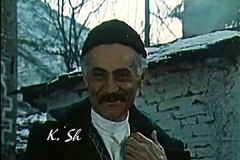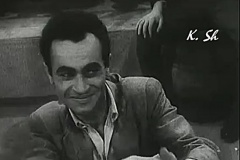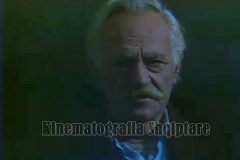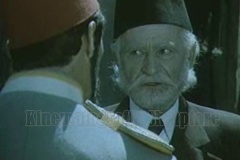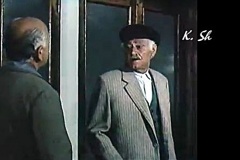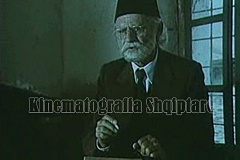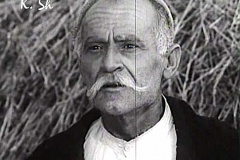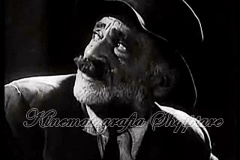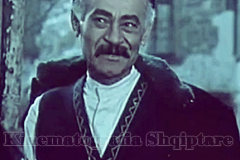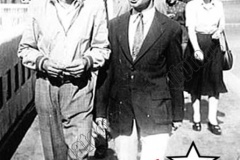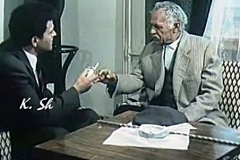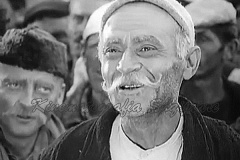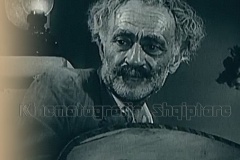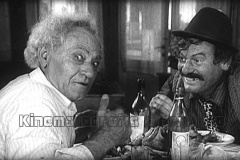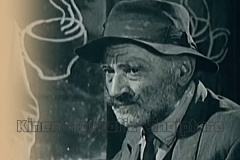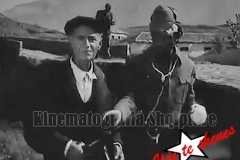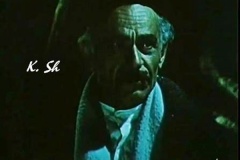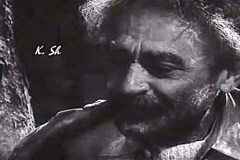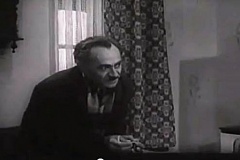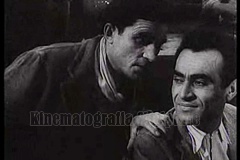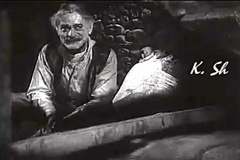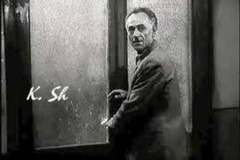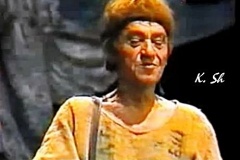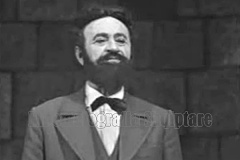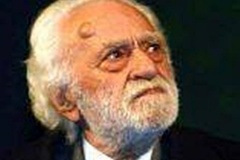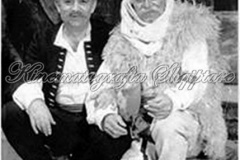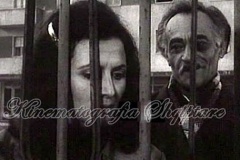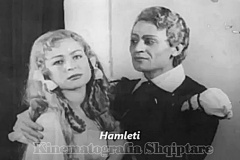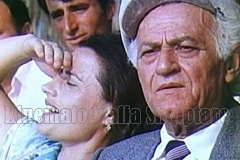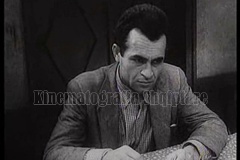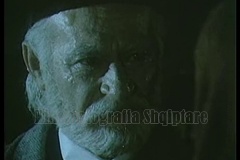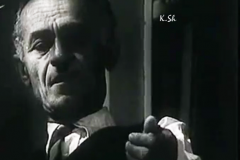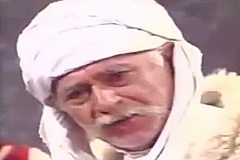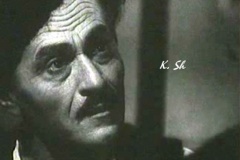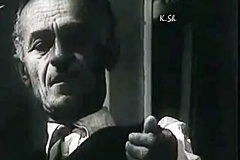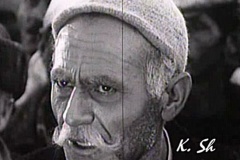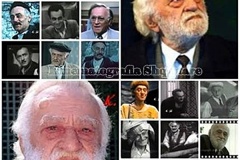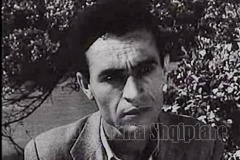Kadri Roshi (1924-2007)
One of the giants of Albanian acting in theater and cinematography. “Great Master of Art”, “Artist of the People”, “Honour of the Nation”!
His two most prominent sayings: “Art is not a mechanical copy of reality, but its type, growth, perfection”.
“As long as I’m alive I’ll play on stage, even if my knees shake.”
It is not at all easy to write the biography of the stars, icons, characters who have made the history of Albanian stage art, where undoubtedly one of them is the colossus of Albanian cinematography, part of it, the unforgettable actor Kadri Roshi. You start to collect facts, as much information as possible to describe such figures of artists and after you think you have said everything, you again feel in yourself that something is still left unfulfilled.
Childhood
Kadri Roshi will be born on January 4, 1924, in Mallakaster. His father Maksuti, who was a very good lawyer, and his mother Sabrija were originally from Libohova.
Eh, the life of K. Roshi as a child will start difficult, unfortunate. At the age of 2, he will be left without his mother, while later, when he was 12 years old, he will also lose his father, this is very difficult for a child. Kadri now had to provide for his life, and so he began to travel through different cities such as Vlore, Kavaje, Gjirokaster, Durres and until he ended up in Tirana. The jobs were different and not even related to performing arts, he worked in the port of Durres as a loading-unloading worker, and then as a maintenance worker.
Later, Kadri will work as a ticket seller at the “Republika” Cinema in Tirana. Unlike the members of his family who were educated and not a few but 20-25 of them, Roshi himself had only 4 classes of education, exactly those of the first years of elementary!!!
At the age of 23, he decided to start a family, married Drita Taho, with whom he would spend his whole life. Drita was originally from Gjakova and she was an artist. Both together will have 2 children, Ermira and Klit, and they will follow the professions of their parents
Artistic life
He recited and beautifully recited the poems of Naim and the great Migjeni, while drawing attention by leaving his primary school teacher speechless.
In 1945, he will compete for a newly created theater group, but it will be precisely this competition that will throw down his test, being considered as an obstacle in speaking and lack of talent.
This would be his first loss. No one would believe that the one who will become an immortal icon of the Albanian scene would leave because he had no talent!?
He decided to compete for the second time. Again, another defeat would follow.
In a competition with 21 participants, Kadri Roshi, again described as untalented and accompanied by another competitor named Naim Frasheri, would lead the list of disqualified.
Conquered by bitterness and hopeless, he will wander the road alone. It seems that at this moment, when his primary school teacher appears in front of him, the first spark will be born that will illuminate his path towards art. After listening and knowing the reasons for the sadness of his former students, the teacher who was already working as a high official decided to go together and meet a friend of his in the fine arts department.
But who was the “golden friend” of the teacher, the man with the black mustache, who they will meet and who decided to help the artist climb to the first level of his career?
Another Albanian figure, the well-known writer Zihni Sako, was precisely the person, friend of the teacher, who decided to help Kadri by giving him the opportunity to work as a prompter.
Not much time would pass, when a small group of non-professionals, in which K. Roshi, N. Frasheri, etc., who were previously considered untalented, also participated, would gather and with the help of friends, they would translate from the French, and then the piece “The Marriage” by Gogol would be staged, where Kadri Roshi interpreted the role of Podgolis, such was the success of this show that this group of amateurs immediately entered the popular theater group and from that day Kadri Roshi was named a definitive actor of the Teatri Popullor”.” (taken from the text of Blerina Roshi – “National Albanian.al”)
In 1947, earning the right to study as an actor, he traveled to Zagreb. Albania will break relations with former Yugoslavia and Kadri Roshi in this period continues his studies by moving to Prague, completing them in 1951 with excellent results. ( “odlično” )
But it was not the degree that gave him glory, but the great love for work. Then he started his career as an actor in the “Teatri Popullor” at the age of 21, being one of the creators of this theater.
From that time until today, he will not be able to count the roles, which make up a great artistic life, where the difficulties of a life of an orphan, an apprentice, a cinema porter and up to the original actor with the portrait of a tribal man are combined.
At his side all the time were the actors of his generation Drita Pelinku, Violeta Manushi, Tinka Kurti, Reshat Arbana, Marika Kallamata, etc.
Kadri Roshi will represent the Albanian stage with the role of Gogol’s Osip, that would have an unprecedented success. From here there is no stopping towards successive successes, becoming an emblem of Albanian Cinematography. He will leave an indelible mark on all Albanian audiences in the interpretation of countless roles, in both theatrical and cinematographic series.
There are about 215 roles without counting the activity as a director or the various activities abroad as a reciter. Dritero Agolli would describe it as follows:
“Kadri Roshi is the patriarch of the Albanian sung word. The word in his mouth takes the sound of the bells, of the German Mountain, the Wide Mountain, of the beautiful polyphonic song, of the gurgling of the rivers.”
While he will express himself about the theater:
“…..that the history of the theater is very long” ….. “others will have the luck to continue this history, as beautiful as it is arduous “.
Honors:
He is considered a legend of the Albanian stage and screen.
In 1995 he was honored with the Career Award at the Artistic Film Festival, in 1997 with the Grand Honorary Award.
He is the “Honour of the Nation” from 1999.
Kadri Roshi’s name is a colossus for Albanian film and theater, where he left outstanding figures that will never be forgotten.
Filmography (from the last to the first of the career):
• Colonel Bunker (1998)
• Albanian Stuntman (1998)
• Farewell (1997)
• Ali Pash Tepelena (1997) documentary, but undiscovered, appears on February 28, 2009, two years after death
• Sounds of Oblivion (1996)
• Plasticine Bullet (1995)
• Mikres mèrès – Short Days (1995)
• A Day in a Life (1994)
• Fox and Grapes – Aesop, (Theatre)
• Death of a Man ( 1991)
• White Papers (1990)
• Mission Across the Sea (1988)
• The Weight of Time (1988)
• Reconstruction (1988)
• When You’re separated From Friends (1986)
• Little Encirclement (1986)
• Postponed Wedding (1984)
• The Engagement of Blerta (1984)
• Apassionata (1983)
• The Warm Wind of the Deep (1982)
• Martyrs of the Monuments (1980), Jani
• Little Partisan Velo (1980)
• Face to Face (1979)
• The Counselors (1979) , Council President Murat Benca
• Freedom or Death (1979), Teacher Hyseni
• Gramophone General (1978)
• Man with a Cannon (1977), Elder Mere
• The Collapse of Idols (1977)
• Hearts that do not grow old (1977)
• Threads that are cut (1976)
• Poppies on the Walls (1976), Caretaker • The Coping (1976)
• Bloody Earth (1976)
• When one day dawned (1971)
• Mountains Clad in Green (1971)
• The Bronze Bust (1970), Ademi
• Tana (1958)
Theater
02/01/1992 — “The Fox and the Grapes (Aesop)” by Guilherme Figueiredo
01/12/1986 — “Under the Stage Lights” by Ruzhdi Pulaha
11/09/1986 — “Shadows of the night” by Vedat Kokona
14/12/1980 — “Era before the trial” by Ekrem Kryeziu…. Abdyl Frashëri
07/04/1978 — “The Patient Doctor” by Ruzhdi Pulaha
24/03/1974 — “Fishermen`s Family” by Sulejman Pitarka (Artist of the People)…Father
03/04/1971 — “Arturo Ui” by Bertold Brecht….Arturo Ui
19/06/1970 — “The irreplaceable” by Qamil Buxheli
12 /11/1968 — “The second face” by Drita Agolli
26/05/1968 — “The roof of all” by Kiço Blushi
07/03/1967 — “Cuca e maleve” by Loni Papa
22/11/1966 — “Perkolgjinajt” by Kolë Jakovo
29/06/1966 — “Three rifle shots” by Ibrahim Uruci
27/03/1966 — “After death” by Andon Zako Çajup
28/05/1964 — “Doctor Alexi” by Ibrahim Uruçi
16/02/1964 — “Three days of doom” by Luan Qafëzezi
11/01/1964 — “Monserrat” by Emanuel Robles
30/06/1963 — “Shtrengata” by Caoy
17/11/1962 – – “The Slide” by Besim Lëvonja (Honored Artist) 13/01/1962 — “Lady of the Inn” by Karlo Goldoni
22/06/1961 — “Fox and grapes” by Guilherme Figueiredo
10/03/1961 — ” Ambition” by Besim Lëvonja
27/11/1960 — “The Dragon of Dragobia” by Xhemal Broja
24/06/1960 — “Hamlet” by Shakespeare………….Hamlet
06/02/ 1959 — Shakespeare’s “Merry Wives of Windsor”
07/09/1958 — “The Youth” by Vangjush Vinçani
04/24/1957 — “The Stranger” by Nazim Hikmeti
06/02/1956 — “Enemies” by Maxim Gorky
28/05/1956 — “Task” by Kola Yakova
25/12/1955 — “Leipzig Process 1933” by Lev Kompanjec, Leonid Kronfeld
22/05/1955 — “Clash” by Xhemal Broja
04 /03/1952 — “Revizori” by Nikolaj Gogol
11/11/1950 — “Halili and Hajria” by Kol Jakova
30/12/1945 — “Rrugaçi” by K. Nase……
Theatre Director
Officer The fight” by Xhemal Broja (as/director)
19/06/1970 — “The irreplaceable” by Qamil Buxheli (as/director) 10/03/1961 — “Ambition” by Besim Lëvonja (as/director)
09/07 /1958 — “The Youth” of Vangjush Vinçani
Awards and Titles
1998 – Honor of the Nation
1969 – People’s Artist
1963 – Merited Artist and “Honor of the City” – Ballsh Order of Work Class.III
1997 Award of Honor
for the interpretation of the role of Ymer in the film “Farewell” at the International Film Festival held in Thessaloniki, Greece in 1997.
May 13, 1995 Cup of Career for the interpretation of the role of the Shepherd Priest in the film “Colonel Bunker” at the 10th Albanian Film Festival held in Tirana from May 10 to 13, 1995.
April 23, 1983
Special Award for the interpretation of the role of Rakipi in the television film “Warm wind of the depths” at the 5th Albanian Film Festival held in Tirana from April 19 to 23, 1983.
April 28, 1979
Special Award for the interpretation of the role of Xha Hysen in the film “Freedom or Death” at the III Albanian Film Festival held in Tirana from April 21 to 28, 1979.
April 23, 1977
Special Award for the interpretation of the role of the Caretaker in the film “Poppies on the Wall” at the III Albanian Film Festival held in Tirana from April 16 to 23, 1977.
Previously published on the page with the same name on Facebook in January 2014 and reviewed the following years.
________________
Albanian Cinematography in activity since 2013
Reference: Nacional Albania.al / selection of online news and information 2014.
Follow us: Blog: https://albaniancinematography.blogspot.com/ Vimeo: Albanian Cinematography (vimeo.com) Facebook: https://www.facebook.com/ksh.faqjazyrtare Dailymotion: https://www.dailymotion.com/kinetografiashqiptareartisporti YouTube: https://www.youtube.com/channel/UCDRYQ5xCyGkfELm3mX8Rhtw
Discover more from Albanian Cinematography - Sport
Subscribe to get the latest posts sent to your email.


